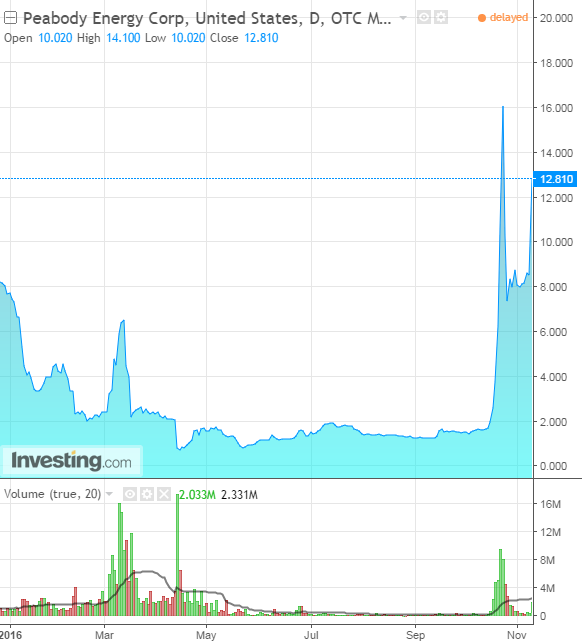by Clement Thibault
Markets may have survived the shock of a Trump victory, and may even prosper during president-elect Donald Trump's administration. But reading the few tea leaves that are currently in place via sound bytes of Mr. Trump's, uttered during the course of an overheated and overly hyperbolic campaign, it seems clear to us that certain market sectors, alongside specific companies, stand a better—and for some, worse—chance of benefiting from the new president's efforts to 'Make America Great Again.'
Energy
Buy: Coal
Obama's second term has been marked by vigorous efforts to fight climate change. His administration initiated the Clean Power Plan, a set of regulations meant to reduce the nation's harmful ecological impact, including by taking steps to minimize the pollution emitted from coal burning power plants. While campaigning in Detroit this past August, President-elect Donald Trump said he intends to "put our coal miners and our steelworkers back to work."
One company positioned to benefit from Trump's view on energy regulation is Peabody Energy Corp (OTC:BTUUQ), the St. Louis-based coal and gas provider that filed for bankruptcy protection last April, after years of declines and thousands of jobs eliminated. Despite its coal mines still showing a profit, the ongoing collapse of coal as an energy commodity forced the company to declare bankruptcy after years of accumulated debt. A renewed interest in coal as an energy resource, and a fresh injection of capital could lift Peabody and the entire industry out of its misery. That could have started yesterday when shares of the company jumped from $8.50 to $12.80 per share, a 50% up-move on the Trump victory news.

Sell: Renewable Energy
If the concept of global warming was created by and for the Chinese in order to make U.S manufacturing non-competitive as Trump famously claimed, will he repeal renewable energy subsidies? It's possible.
Should that occur, there are a few solar energy companies, including Elon Musk's SolarCity (NASDAQ:SCTY), or Vivint Solar (NYSE:VSLR) that could take a hit if their customers no longer receive government rebates on purchases. Similarly Tesla (NASDAQ:TSLA).
If Trump's energy-related plans turn out to be more than just stump speech rhetoric, there will indeed be some very clear winners and losers in this sector.
Technology
Buy: BioTech
Biotech shares have been depressed during the past year, as industry pricing practices were put under the microscope by presidential hopefuls, specifically Hillary Clinton and Bernie Sanders. Mylan (NASDAQ:MYL), Teva (NYSE:TEVA) and Valeant Pharmaceuticals (NYSE:VRX) among others, all found themselves under sharp scrutiny by the public and politicians. Investors were correctly afraid of government intervention into healthcare pricing models. Though Trump won't necessarily benefit the industry in any way, Clinton would have certainly hurt it. So a Trump win is also a giant win for Big Pharma.
Sell: High-Tech
Apple (NASDAQ:AAPL) and Mr. Trump have been sparring on multiple issues, but it's not the words exchanged that matter. Rather it's two of what appear to be Trump's central issues, immigration and offshore outsourcing.
Trump has strongly come out against H-1B visas which are used to hire qualified high-tech employees from outside the US (he's also decried the practice of sending work overseas, which Apple is known for, but more on that below). Since Trump's platform relied heavily on saving and adding jobs for American workers, anything initiated to stop the influx of foreign labor will hurt high-tech companies by raising their operating costs and potentially slowing their growth. Apple and Facebook (NASDAQ:FB), Netflix (NASDAQ:NFLX) and Amazon (NASDAQ:AMZN) will all suffer from a move limiting worker immigration.
Machinery
Buy: Infrastructure
According to a late October report, Trump plans to spend over $1 Trillion dollars on infrastructure, as part of his plan to create jobs for American citizens. Trump's plan would rely heavily on private funding, with the help of a government tax credit. Infrastructure companies such as Caterpillar (NYSE:CAT) and U.S Steel (NYSE:X)) will certainly try to make the most of the renewed interest in their services.
Sell: Automobile manufacturers
Trump's frequent, and vehemently stated opposition to the relocation outside the country's borders of US-based manufacturing will hurt those companies that are currently heavily dependent on offshoring – such as automakers. In June, Trump promised to block Ford's (NYSE:F) new plant which is set to open in Mexico. Ford isn't the only manufacturer looking at potentially large setbacks to the way they now do business. General Motors (NYSE:GM) and all American automakers are in the same boat. Any tariffs imposed on trade with Mexico, and any regulations on importing goods manufactured abroad, will increase costs for all parties involved. And that will likely include more than just automakers.
